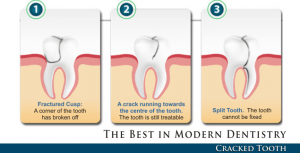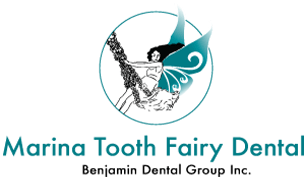
Photo credit: Gantz Dental
When people living longer and more stressful lives, cracked teeth are seen more and more often at the dentist’s office. Yet cracked teeth can be difficult to detect for a number of reasons, most notably that the pain often comes and goes. Because of the short periods of erratic pain, it can be difficult to discern which tooth is the culprit.
Is a cracked tooth literally “cracked”?
A cracked tooth is simply a tooth that has a crack or fracture running along the length of the tooth. Older teeth, or teeth that are otherwise compromised, are usually susceptible to cracking. In particular, teeth that have fillings have a tendency to crack because they are already weakened from the filling itself.
How does it happen?
One of the main causes of cracked teeth is eating hard foods, and especially hard candies. Biting down on hard foods puts undue stress on your teeth, eventually causing a crack to form. Often times, clenching or grinding teeth at night can also cause cracks.
What can you do and why does it need to be fixed?
When the outside of a tooth cracks, it causes the inside of the tooth, or pulp, to become irritated. Because pulp is comprised of tissue that includes blood vessels and nerves, this irritation generally leads to pain and discomfort. Biting pressure that is quickly released can also cause a pinching of the pulp, which results in a quick, sharp pain. Over time more irritation to the pulp can lead to infection of the tissue with even larger problems in store.
It is important to know the signs of a cracked tooth so that you can catch it early, before significant damage occurs. If you feel a sharp pain when you bite down on a hard food, or have sensitivity when your tooth is exposed to heat or cold, then chances are you may have a cracked tooth.
Although cracks might only cause minor discomfort to begin with, it is still a good idea to have your dentist check things out. Depending on the size and location of the crack your dentist will decide what the best course of action is. Cracked teeth are often fixed with a filling or a crown, which helps ensure the tooth is solid. In the case of a more serious crack, your dentist might recommend a root canal or having the tooth extracted – but this is uncommon for a simple cracked tooth. Acting early can help you to avoid larger problems down the road.
Source: RevenueWell & Marina Tooth Fairy March 2016 e-newsletter
